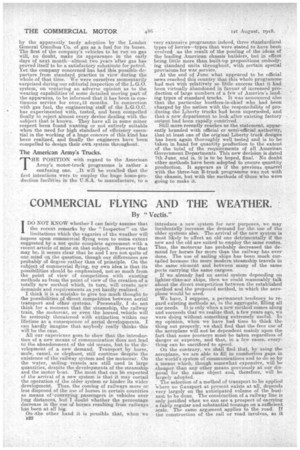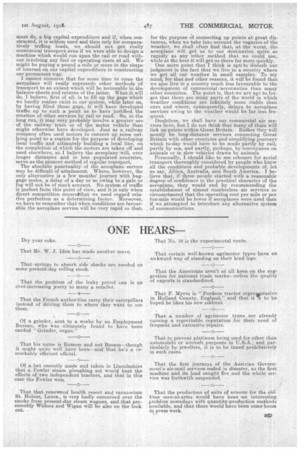COMMERCIAL FLYING AND THE WEATHER.
Page 2

Page 3

If you've noticed an error in this article please click here to report it so we can fix it.
By Vectis."
IDO NOT KNOW whether I can fairly assume that the recent remarks by the ' Inspector" on the limitations which the vagaries of the weather will impose upon commercial flying were to scam, extent suggested by a not quite complete agreement with a recent article of mine on that subject. However that may be, it seems clear that he arid I are not quite of one mind on the question, though our differences are probably of degree rather than of principle. On the subject of commercial flying, my own idea is that its possibilities should be emphasized, not so Much from the point of view of competition with, existing methods as from the point of vietv of the creation of a totally new method which, in turn, will create new demands' and requirements as yet hardly realized. I think it is a mistake to give too much thought to the possibilities pl 'direct competition between aerial -transport arid other systems: Personally, I do. not think for a moment that the steamship, the railway train, the motorcar, or even the horsed_vehkle will be seriously threatened with extinction within our lifetime as a, consequence of aerial developments. I can hardly imagine that anybody really thinks, this will he the case.
All our experience goes to show that the introduction of a new means of communication does not lead to the abandonment of the old means, but to the development of a new demand. Transport by horse, mule, camel, or elephant, still continue despite the existence of the railway system and the motorcar. On the water, sailing vessels. are still used in large quantities, -despite the developments of the steamship and the motor boat.. The most that can be expected or the arrival of a new system. is that it may curtail the operation of the older system or binder its wider development. Thus, the corning of railways more or less disposed of the IlSB of horses in certain countries as means of'.conveying passengers in vehicles over long distance, but I doubt whether the percentage decrease in the use of horses resulting from railways has been at all big.
On Ahe other hand it is possible that, when we 1322 introduce a new system for new Purposes, we may incidentally increase the demand for the use of the older systems also. The arrival of the new system. is most likely to affect -an old one detrimentally if the new and the old are suited to employ the same routes. Thus, the motorcar has probably decreased the demand for horses far more than the railway has ever done. The use of sailing ships has been much curtailed because the more modern Steamship travels, in the same element and between many of the same poets carrying the same cargoes.
If we already had an aerial system depending on lighter-than-air ships, then we could reasonably talk about the direct competition between the established method and the proposed method, in which the aeroplane would be used. .
We have, I suppose, a permanent tendency to regard eXisting methods as, in the aggregate, 'filling all our needs. It is only when a new method comes along and succeeds that we realize that, a few years ago, we were doing without something extremely useful. In my 'opinion, when we have had time to think the thing out properly, we shall find that the free use of the aeroplane will not be dependent mainly upon the fact that some journeys must be taken regardless of danger or expense, and that,in a few cases, 'everything can be sacrificed to speed. On the contrary, we shall find that, by' using the aeroplane, we are able to fill in numberless gaps in the world's system of communications and to do SD by a means which; though somewhat expensive, will be cheaper than any other means previously at (nildisposal for the same object and, therefore, will be largely adopted. The selection of a method of transport to be applied Where no a.ansport at present exists. at ssil, depends very largely on the "anticipated volume of the business to be done. The construction of a railway line is only justified when we can see a prospect of carrying a fairly regular and substantial tonnage on a sufficient scale. The. same argument applies to the road. If the construction of the rail or road involves, as it
must do, a -big capital expenditure and if, when constructed, it is seldom used and then only for comparatively trifling loads, we sheuld not get reallY economical transport even, if we were able to design a machine which would run upon the rail or road without involving any fuel or operating costs at all. We might be paying a pound a mile or more in the shape of interest on our capital expenditure in constructing our permanent way. .
I ca.nriot conceive that for some time to come the a,eroplane will really supersede other methods of transport to an extent which will be noticeable in the balance-sheets and returns of the latter. What it will do, I believe, first of all, is to fill up the gaps which we hardly realize exist in our system, while later on, by having filled those gaps, it will have developed traffic up to such a point as to have justified the creation of other services by rail or road. So, in the long run, it may very probably involve a greater use of the railway train or of the motor vehicle than might otherwise have developed. Just as a railway company often used motors to connect up some outlying point to a station for the purpose of developing local traffic and ultimately building a local line, on the completion of , which the motors are taken off and used elsewhere, so I believe the aeroplane will, over longer distances and in less populated countries, serve as the pioneer method of regular transport. The absolute punctuality of the aeroplane service may be difficult of attainment. Where, however, the only alternative is a few months' journey with baggage mules, a, delay of a day or so owing to a gale or fog will not be of much account. No system of traffic is perfect from this point of view, and it is only when direct competition occursithat we need regard relative perfection as a determining factor. Moreover, we have to remember that when conditions are favourable the aeroplane service will be very rapid so that, for the purpose of connecting up points at great distances, when we take into account the vagaries-of the
weather, we shall often find that, at the -worst, the a,evoplana will get na to our destination quite as rapidly as any other method that we could use, while at the best it will get-us there far more quickly.
One more point that I think is apt', to disturb our judgment is the fact that we live in a -country where
we get all our weather in small samples. To my mind, for that and other reasons, it wilt be found that we also live, in a country much less favourable to the development of commercial-aeronautics than many other countries, The point is, that, we are apt to.for
get that there are many parts of the world in which weather conditions are infinitely more stable than ours and where, consequently, delays to aeroplane services owing to the weather would be far less frequent. Doubtless, we shall have our commercial air services here, but I do not think that Many of them will
link up points within. Great Britain. Rather they will mostly be long-distance services connecting Great Britain with other countries and simplifying journeys' which to-day would have to be made partly by rail, partly by sea, and partly, perhaps, by:conveyance on animals or in slow vehicles drawn by animals.
Personally, I should like to see schemes for aerial transport thoroughly considered by people who know all the conditions and probable developments of, let us say, Africa, Australia, and South America. I believe that,' if these people started with a reasonable degree of confidence in the practical character of the aeroplane, they would end by recommending the establishment of almost numberless air services so circumstanced that the.operating cost per mile or per ton-mile would be lower if aeroplanes were used than if we attempted to introduce any alternative system of communications.






















